How Elon Musk tried to destroy the informant in the ranks of Tesla, and what came of it
- Transfer
It all started with a loss of self-control on Twitter, and ended with a false accusation of mass killings. Former security manager says Tesla tends to spy on employees and spread misinformation about them
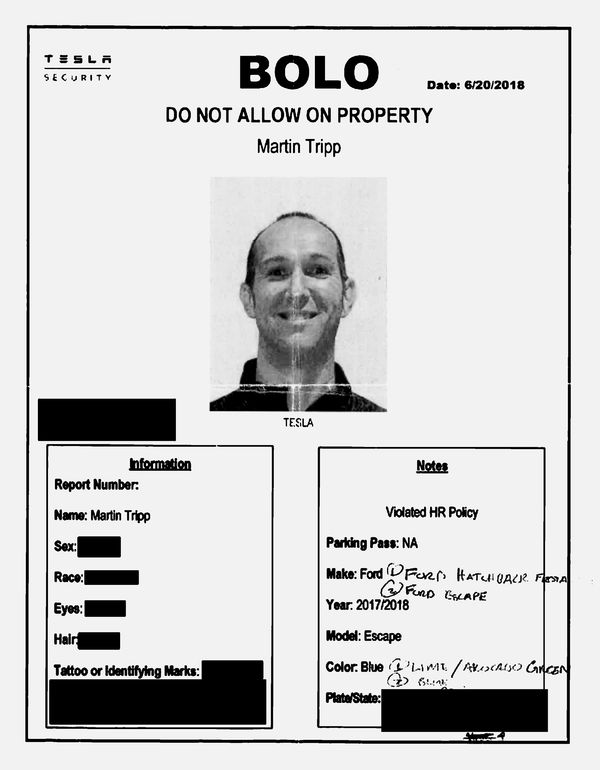
Warning information for the company's employees about the wanted criminal turned out to be false.
According to the extraordinary standards of life of Ilon Mask, this story was far from a blockbuster. On June 4, 2018, Business Insider wrote that Tesla Inc. rejects or sends for alteration 40% of the raw materials at the Gigafabrika factory located in the Nevada desert, where batteries are produced. The article quoted a source calculating that such low efficiency cost the electric car company Mask $ 150 million, and describing the huge mountains of rejected materials found in the factory. Tesla denied these allegations, and after a few hours the world forgot about it.
Peace, but not Elon Musk. Although no one asked him about this article at the company’s annual meeting the next day, he digested this information for weeks and sent a team of investigators to find who shared this information with the press.
They determined that Martin Tripp, a 40-year-old thin-skinned man who had worked in various factories for the rest of his career and then settled on the conveyor of the Gigafactory, was responsible for the leak. Trip later claimed to be an idealist trying to improve Tesla's performance; Musk considered him a dangerous enemy, engaged in "large-scale and destructive sabotage," as he wrote in a memo. He also believed that Trip shared information not only with the press, but also with "unknown third parties."
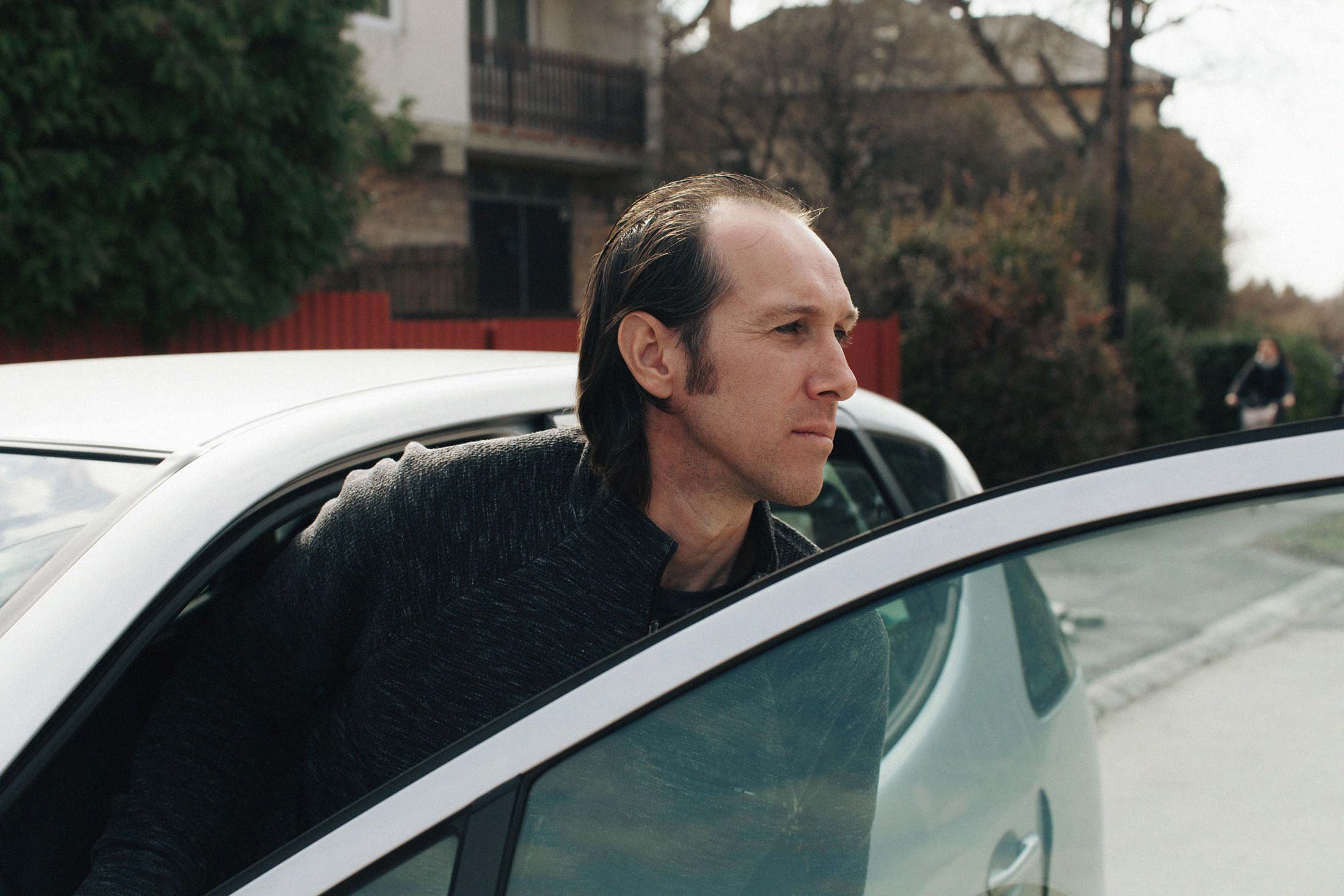
Martin Trip
Could something more be behind this, Musk reasoned aloud? Could Trip coordinate with one of Tesla's many enemies - oil companies, competing car makers, Wall Street short-sellers? “The list of organizations wishing Tesla die is very long,” he warned.
On June 20, the company filed a lawsuit against Tryp in the amount of $ 167 million. On the same day, Trip was contacted from the office of the Sheriff of Story County (Nevada). Tesla's security department warned police that in an anonymous company call, Trip was planning a massacre at the Gigafactory.
When the police attacked Trip in the evening of that day, he was unarmed and cried with fear. He said that he was terribly afraid of Mask, and suggested that the billionaire himself could make this anonymous call. The sheriff had to reassure Trip, and then call Tesla to report the absence of threat and danger from Trip.
Many company directors would simply try to ignore a person like Trip. But Musk instead decided to destroy him, as follows from evidence obtained from the police, former employees and from the documentation of the internal investigation conducted in Tesla.
The public relations department spread rumors about Tripe's suicidal tendency and his membership in a group plotting a global conspiracy. On Twitter, Musk suggested that a Business Insider reporter, Lynette Lopez, received money from short-sellers and claimed that Trip acknowledged accepting bribes from her in exchange for Tesla's “valuable intellectual property”. Lopez denied the allegations.
The Trip incident triggered such an epic storm on social media that the U.S. Securities and Exchange Commission forced Tesla to hire a special Twitter overseer, a lawyer who should endorse Mask's tweets. Since last summer, among the wild antics of the Mask are:
- Groundless Twitter accusation of pedophilia by a British speleologist diver.
- A false statement on Twitter that investors raised money to buy Tesla at a price of $ 420 per share, which led to a lawsuit from the Securities and Exchange Commission.
- Somehow, hostility with the second-tier hip-hop songwriter Azilia Banks (“Ilon will very soon find out which of us is more influential,” Banks wrote on Instagram).
- Cant smoking during a live podcast broadcast, leading to a revision of the security clearance required to work with SpaceX.
The way Musk behaves with Trip threatens to complicate all this legal and regulatory mess. The security manager at the Gigafactory, a former military man with a distinctive haircut named Sean Gutro, complained about the company's work with the Securities and Exchange Commission. Goutro says that the operation related to the elimination of information leakage was unethical. He claims that investigators hacked into Trip's phone, tracked him, and misled the police about his actions. Gutro says that Trip did not sabotage and crack nothing, and that Musk knew this, and wanted to destroy his reputation by spreading misinformation.
A Tesla spokeswoman said in a statement that Goutro’s allegations were “false and too bloated,” but did not go into details. She said that the company had no problems with Goutro until he was fired for "poor performance." Goutro disputes this and says that basically his performance was good. He says he made his statement so that regulators and the public know what Tesla is capable of.
“They can afford something that I didn’t even suspect,” he says. “I just laid bricks.”
Gutro is not the first among those who decided to tell the world about how they solve security issues in a fast-growing car company. Two years ago, Richard Jacobs, global research manager at Uber Technologies Inc., said his colleagues secretly recorded conversations between directors from competing companies and their own employees, as well as doing other ethically questionable business . He later retook some of the charges, but Uber’s leadership apologized, denied surveillance and promised to play fair. Two Uber investigators blamed by Jacobs, Nicholas Gichinto, and Jacob Nocon sued him for libel, calling his allegations "killing a reputation for money." They said that because of his accusations, it will be difficult for them to find a new job.
They were mistaken. While the press was skeptical about Uber’s alleged atrocities - “It’s just some stupid accusations of a crime,” tweeted Amir Efrati, a reporter for Information — Musk saw promising job seekers. In early 2018, he appointed Jeff Jones, director of security for Uber, chief global security officer at Tesla, and hired Gichinto and Nokon as investigators, and he personally interviewed all three. Musk defended Gichinto in front of the Gizmodo website, saying that he was "made into Uber a scapegoat for the sins of others." Tesla did not provide an opportunity for Gichinto or Nocon to answer our questions; Jones, who left the company in November, declined to comment.
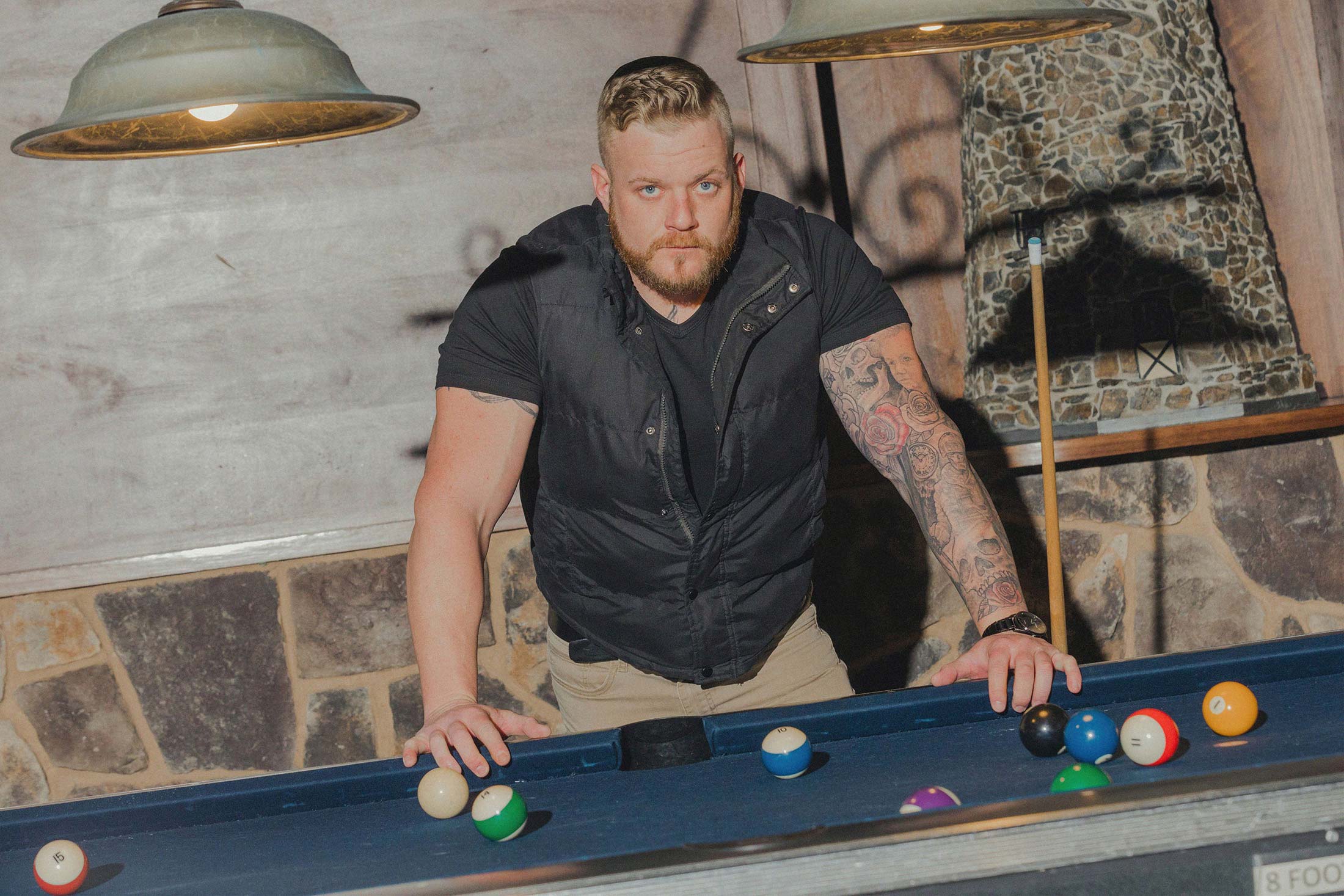
Gutro
At that time, chaos reigned at the Gigafabrika, a huge three-story enterprise 30 km east of Reno. Musk constantly warned that Tesla would have to survive the “ production hell ” while the company hardly hired new employees and accelerated the production of the Model 3. sedan. He suffered very much from what was happening, slept in the office, and later gave tearful interviews, where he admitted that he reached the handle. “It was the most painful, hellish few months in my life,” he said at the company's annual meeting in June 2018.
It was this chaos that Trip wanted to reassure, a former electronics specialist in the U.S. Navy who came to work in 2017. He complained to his superiors that everything was constantly changing at the factory, that spare parts were scattered everywhere, and often it was either unsafe or wasteful. He suggested that the bosses try to reduce the amount of culling, and then wrote a letter to Mask, but did not receive an answer. "I went to tell it to managers, supervisors and all those who just wanted to listen to it, - he said later in an interview Trip Guardian. “But everyone said: Yeah, well, okay.”
Goutro says that if Trip was ignored, then in particular because the problems he mentioned were not the most difficult. Gigafactory, one of the largest in the worldproductions by area were filled by workers so quickly that it was practically impossible to control them. Shortly after Gutro began work in January 2018, he discovered that many employees, some of whom lived directly in cars in the production area, used cocaine and meth in toilets. Others had sex in the unfinished parts of the factory. Goutro says that the scanners used by security guards to check employees' badges did not work reliably, and they let anyone with a piece of paper with them that looked convincing enough. Local recycling centers called him, saying that the thieves tried to sell them strange spare parts from electric cars.
Goutro was supposed to come up with a system that would restore order. He is a former marine of 32 years old, hefty, with a sleeve stuffed on his left hand. He worked for Facebook Inc. in the security center, where they reacted to dangerous situations caught in the video broadcast. The work was ungrateful, but Goutro says that on Facebook the professional atmosphere was much better than on Tesla. Goutro said the company’s lawyer told him how the previous head of security at the Gigafactory, Andrew Cheroni, quit after an unpleasant scandal. The lawyer said that Cheroni, at the direction of Mask, was spying on union meetings, and then threatened to tell everyone about this when he quit. Cheroni declined to comment on this information.

Gigafactory
And while Gutro was trying to deal with the problems of sex, drugs and extreme disorganization, Trip decided to appeal to the public. He climbed into the internal production base and rummaged there to assess how much material wastes. He decided to turn to Lopez, who wrote about Tesla for Business Insider, sent her all the numbers regarding waste, and images of parts of batteries that he said were fire hazardous.
Trip hoped that when Lopez’s story became public, Tesla would have to make the changes he proposed. But instead, Tesla stated that the waste was acceptable and that damaged batteries were not put into the finished machines. “We had a high percentage of processing in the early stages of Model 3 production, as you would expect for any new production,” Tesla told Business Insider. “We want to make sure that only the highest quality parts are used to create the best machines for our customers.”
Meanwhile, Gutro went to work to find the source of the data leak, and watched the videos in the workshops. At the same time, according to him, Gichinto and Nokon were spinning the sequence of events in the opposite direction to find out who was gaining access to the data on the basis of which it would be possible to compose the numbers that got into Business Insider. And it turned out that it was only the Trip that got access to the information that was quoted in the article.
The security guards found their man, but did not know what other secrets he could spy. Trip and several other employees were asked to give their laptops allegedly for a routine update, but in fact - for an audit. Goutro also sent a security guard to the assembly shop undercover to look after Trip.
On June 14, when Trip arrived at work, he was met by a representative of the Human Resources Department, who took him to the meeting room. Gichinto and Nocon awaited him there. Judging by the decryption received by Bloomberg Businessweek, the conversation began in friendly tones, and investigators asked Trip about the reports sent to them by the authorities. “For me, this is a matter of public safety,” Trip said, patiently talking about the punctured batteries he had seen. They mentioned the article in Business Insider several times, without asking Trip directly if he was the source of the information.
Then, after two and a half hours, investigators uncovered the fact that Trip was the only person to gain access to production statistics. Trip admitted that he is the source of the leak. But it follows from the transcript that he denied allegations of taking bribes - despite the fact that Musk later tweeted the opposite - and said that he didn’t tell anyone else. Goutro, who was not in the meeting room, said that he once saw his colleague read text messages and mail sent by Trip during a break in interrogation. He says that in Tesle, they could somehow get access to Trip's communications in real time.
The interrogation lasted almost six hours. Towards the end, the investigators seemed to sympathize with Trip, telling him that he “hadn’t even done anything wrong.” Trip took out his phone and showed them the video on which he plays the guitar. “Dude, this is impressive,” one of them said. Goutro says that they reported the entire Mask, who was furious, via video link. Trip was fired from Tesla on June 19.
The next day, news of the lawsuit leaked online. Trip looked for information about himself and found an article entitled “Martin Trip: 5 Facts You Need to Know About,” which stated that he lives in apartments in the city of Sparks. He panicked, imagining who might try to find him, and sent Mask an email. “You have earned all this with a lie to the public and investors,” he wrote.
But his former boss gladly began to push him. “Threats to me only make your situation worse,” Musk said. He later wrote: “You need to be ashamed that you are substituting other people. You are a terrible person. "
“I NEVER framed someone else and didn’t even make it clear that someone else was connected with my receipt of documents about your WASTE COST IN MILLIONS, problems with safety and lies to investors and the whole WORLD,” Trip responded. “Driving cars with safety problems on the road is what it means to be a terrible person!”
An anonymous call about the shooting arrived at the Tesla call center a few hours later; then Goutro redirected him to Sheriff Storey's office. Tesla also printed a BOLO leaflet - be on the lookout. transl.] - with a smiling trip face on it and the words "do not let him into the territory."
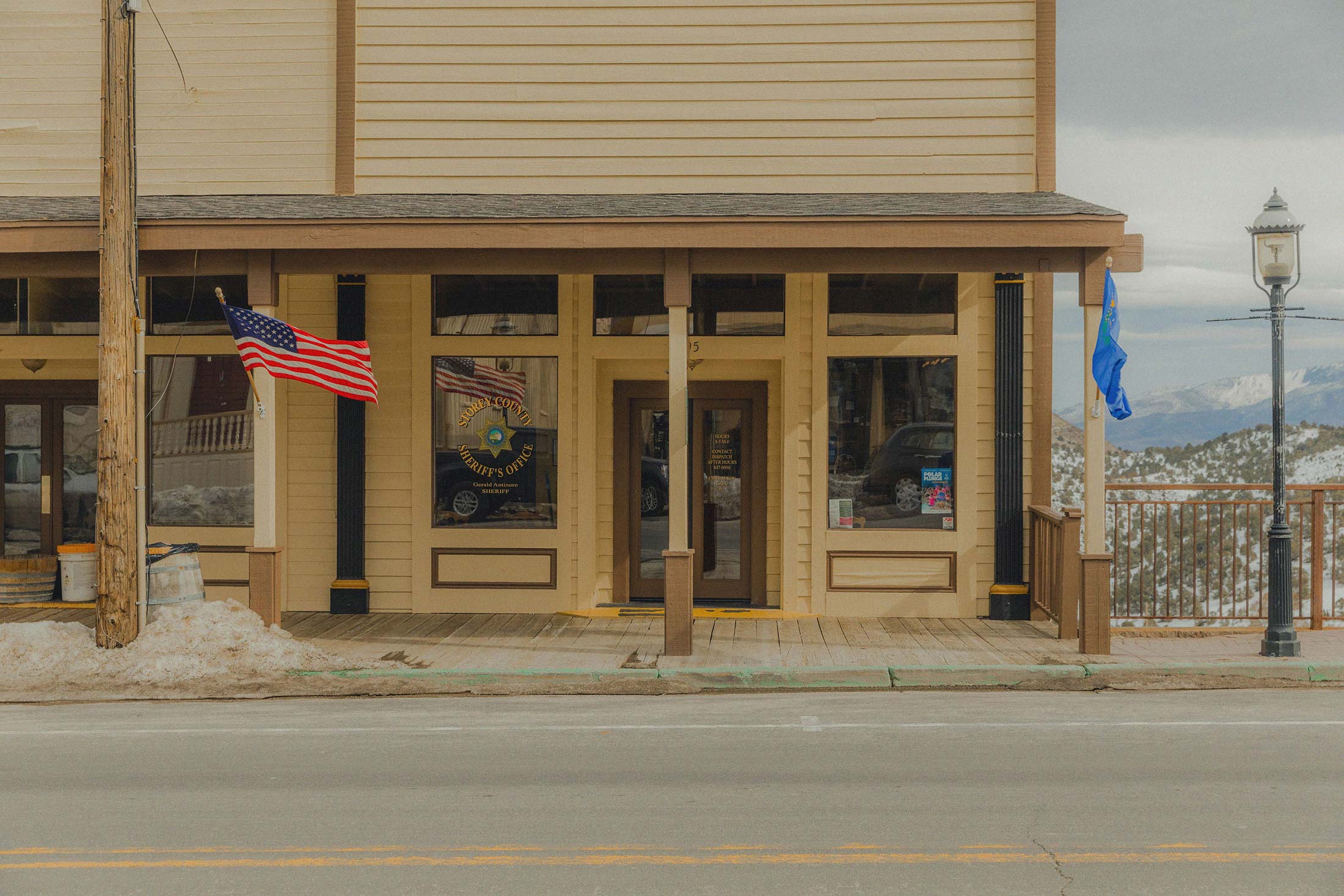
Storey County Sheriff's Office in Virginia City (Nevada)
After Gutro called the sheriff, he made another call to private investigators, who, according to him, were on the company's salary, and asked them to find Trip. Detectives found him before the police, tracking him to the Naget Casino in Reno. Goutro says the boss told him not to tell the police that Tesla was following the Trip.
In the meantime, Musk wrote a letter to a Guardian reporter: “I was just informed that they called us at the Gigafactory and said that he was going to return to us and shoot people,” Musk wrote. “I hope everything is all right with you all,” the reporter replied.
Assistant Sheriff Tony Dosen, met with Trip on the street, next to the casino. Video from the police officer’s body camera shows how Trip trembled and sobbed as he approached the police officer. He said that he has no weapons. Then he sat down on a bench and began to tell the police what happened after he made a clumsy attempt to convey to one of the richest and most famous people in the world.
“They always say that I steal data,” one could hear Trip's words between sobs. “But I'm not so smart.” He said he found out about the threat he allegedly raised from a Washington Post reporter who called him after a message from Tesla.
“It's pretty weird,” Dosen told Tripu. “Like a movie.”
The Storey County Sheriff’s office is located in Virginia City, a town that boasts a single traffic light with a population of 855 people and banal Wild West tourist attractions. It is so sleepy that they often call the police asking them to drive the raccoons out of the garbage cans. Among their main tasks is to issue work permits for prostitutes in a local brothel.
Gerald Antinoro is a sheriff and looks appropriately dressed in black cowboy boots, a black denim vest and black Wrangler jeans, with a gun on his hip. Sitting in his office and talking about this incident several months later in an interview, he says that he is still puzzled and amused by the threat of shooting at the Tesla factory. He says that when he began to deal with the anonymous call after the police talked with Trip, the threat seemed to him not as terrible as one might think from the company's statement. The caller said that Trip was unstable, but did not say that he went to the factory to arrange shooting. “Remember how you messed with the phone as a child? - asks Antinoro. “They just blew an elephant out of a fly.” He terminated the investigation when Tesla refused to provide Tripe’s colleague, who could make this call. From the point of view of Antinoro, one of the oddities of this situation is that after he informed the company that the threat was false, he was asked to issue a press release to inflate this situation. He refused, but Tesla still made it public. The next morning, after exposing the threat, a company representative sent an SMS to another reporter: “Yesterday, a friend of Trip called us and said that Trip was going to come to the Factory“ and shoot everything there. ”
“This is one of those mysterious cases,” the sheriff said. “The only way the press could find out about all this is from the company itself.”
At the end of the story, Trip hired a lawyer and filed a complaint with the Securities Commission, which receives up to 10,000 such complaints per year. Out of every hundred complaints, less than one turns into a real case, but an impressive amount can reach lucky informants - up to 30% of the fine.
The lawyer, Stuart Meisner, specializes in working with informants. He is known for work with an employee of Monsanto Co. who received a reward of $ 22 million in 2016. But Meisner seems to be not too picky in choosing customers. On his websiteYou can see a whistle, a bag of money and a photo of the lawyer himself. “Your reward as an informant can draw millions of dollars,” it says. “We will make a 20% discount on any offer from competitors.” Meisner says he carefully checks potential customers.
Since then, Trip has already changed his lawyer, but the publicity of the case has attracted the attention of one of Gutro's subordinates, Karl Hansen. Last summer, Hansen, a former military investigator and special agent, flew to New York to meet with Meisner, who arranged for his appearance on Fox Business. His accusations were even more wildthan that of Trip: Hansen said that Tesla ignores the huge number of cases of theft and drug trafficking in the Gigafactory. “A member of the Mexican cartel was involved in the supply of large volumes of methamphetamine and cocaine,” he said on the air, and complained that his investigation into the incident was prematurely closed.
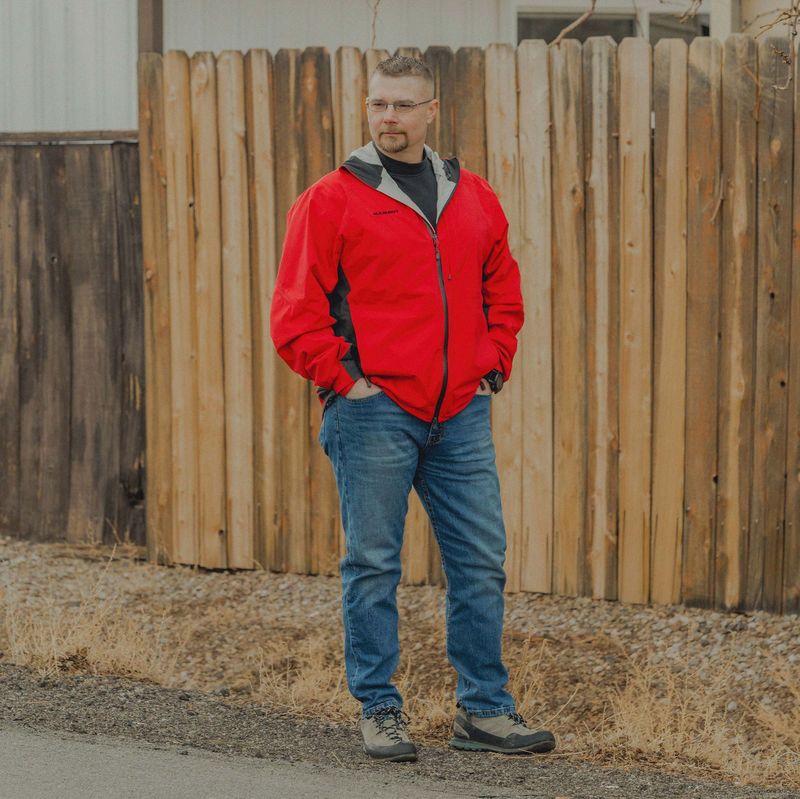
Karl Hansen
Hansen returned to Reno and, as if nothing had happened, went to work, apparently not thinking that Mask might not like his sudden media tour. He was fired that day. Sheriff Antinoro said he investigated these allegations and they did not seem trustworthy to him. Musk told Gizmodo that Hansen was "completely crazy" using peanut emoji. [nuts - crazy, peanut - peanuts / approx. transl.].
Goutro says that after leaving Tesla in December, Hansen convinced him of the need to make the incident public. He hired Meisner and sent a formal complaint to the Securities Commission, where he confirms Hansen's statements. “We started to identify certain trends, and that’s what happened,” says Gutro. He worries that after such public outings it will be difficult for him to find a job, but says that telling the truth to people is too important.
Goutro and Hansen, apparently, sincerely believe that the actions against Trip that they helped the company were wrong. They also say, without evidence, that a Tesla investigator installed a device in the factory that monitors all personal conversations.
Even if what Goutro and Hansen say is true, it is unclear whether the Securities Commission will open the case because of this. Trip, however, may have more relevant information. He moved to Hungary, where his wife has a family to avoid public attention; but in July they called him from the Commission, and talked with him for several hours. A person who knows the details of the conversation said that Trip told the agency that the data he found contradicted the production figures that Mask was promoting. “What Tesla did with Trip is terrible,” says Trip's lawyer, Robert Mitchell, representing him in a counterclaim against the company. “His life is over. He is afraid of these guys. "
Musk, remaining in his repertoire, is still arguing with the Commission. The agency asks the judge to find him guilty of violating the terms of the agreement concluded after the tweet about $ 420, and may demand that he be removed from the management of the company. This battle distracts from the fact that this year was wonderful for Musk. Tesla has achieved its goal of producing 5,000 cars a week in July. Last month, the company lowered the price of Model 3 to $ 35,000, although this seemed impossible. In March, the company introduced the Crossover, Model Y. At the beginning of March, SpaceX successfully completed testing the capsule, which will someday deliver astronauts into orbit.
Antinoro said he had forbidden staff to investigate crimes at the Gigafactory until Tesla began to collaborate. He decided that big business lives in some kind of strange world. “Standard Oil was probably as weird as Elon Musk,” he says.
